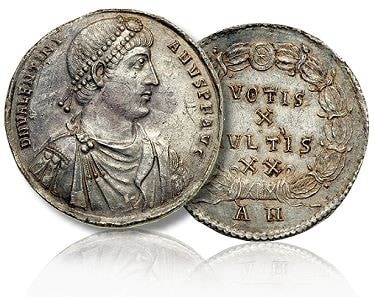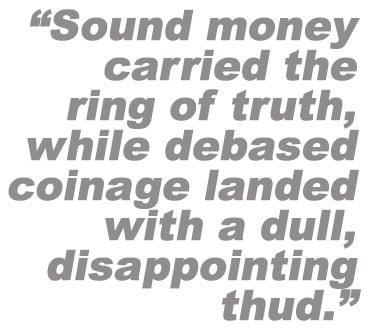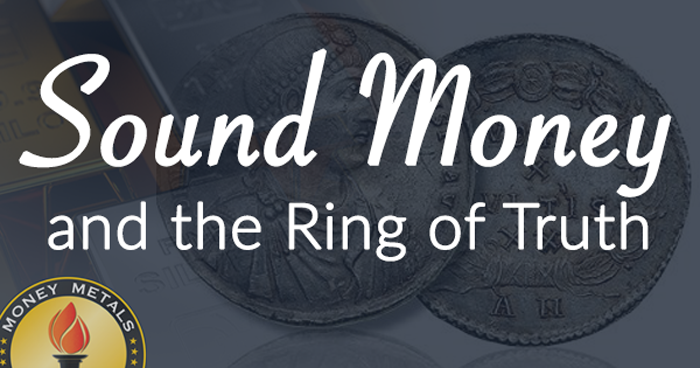We Americans no longer carry gold and silver money in our pockets and purses as our grandparents did during their lives. But we still carry the history, legacy, and spirit of those gold and silver coins in our language – with more meaning than you might imagine.
 |
“Sound money” has a clear message recognized for centuries around the world. It describes the musical, metallic ring of a gold, silver, or copper coin dropped on any hard surface of glass, stone, wood, or metal. Sound money refers to real wealth, with a natural, unmistakable signature of honesty and integrity, as opposed to the swishy paper and plastic debt used almost exclusively today.
The term “sound money” is believed to come from Ancient Rome, where small silver coins were standard in everyday commerce, for paying Roman soldiers to buy exotic goods from all corners of the known world. As Rome squandered its wealth, it found what seemed an easy shortcut to shore up the treasury. It gradually debased those silver coins with common metals, ultimately cutting the silver content to just 5 percent.
But that didn't fool anyone for long, most of all disciplined Roman soldiers, who did not appreciate being paid with worthless mystery metal in return for risking their lives on Rome's bloody battlefields.
Do You Want True Money or a Debased Dud?
Not every Roman soldier had room in his gear for a touchstone, usually fieldstone or slate, also used to test the purity of metals. But they quickly discovered the difference between the sound of true money and a debased dud.
 |
They recognized that real silver had a distinctive melodious ring when bounced on a hard surface, such as the blade of a handy sword, a bronze breastplate, or an ornate marble floor. Sound money carried the 'ring of truth,' while debased coinage landed with a dull, disappointing thud.
The debasement of Rome's silver currency unmasked the deceit of a bankrupt empire, which ended with the fall of Rome, a pattern repeated many times. Sound money's “ring of truth” had found its place in the history of money and nations.
As the United States grew westward to the Pacific Coast and north to Alaska, gold, silver, and copper coins of all nations were legal tender in the young United States until the 1850s, and were in use even long after that. Americans with no formal education in reading, writing, and arithmetic relied on the sight, sound, and feel of the only money they knew. Learning the different musical ringing sounds of those coins could easily qualify even a prairie settler fresh off the wagon train as an economic expert.
In the Old West of the range roving American cowboy, the ring from that silver dollar tossed on the bar of polished oak told the saloon keeper he was pouring whiskey for sound money, and not for a counterfeit forgery.
The sound money test unmasked one of the most famous counterfeiting schemes in American coinage history. The Liberty Nickel (1883-1913) was originally struck without the words “Five Cents,” bearing instead only the Roman numeral “V.” Gold-plated Liberty Nickels were passed off as a newly designed $5 gold piece, but the sound money test quickly identified the scandal. Within six months of issuing the first “V” nickels, the U.S. Mint added the words “Five Cents.” But for the next many years, every Liberty $5 Half Eagle in town was tested for its ring of truth.
Sound money means simplicity, honesty, and trustworthy recognition. It stands for strength and durability which were also characteristics of those pioneering Americans who built our nation.
The ring of sound money for centuries has transcended borders and nationalities by singing its melodic language. No matter what words were stamped into a precious metal coin, that ring of sound money certified its value, or exposed the deception.
Governments Have Distorted the Meaning of Money
“Sound money” carries such a powerful message there's little wonder that governments issuing paper fiat currency have attempted to corrupt its meaning, with help from unimaginative and lazy educators and journalists.
“Hard currency” first referred to metal coins, not paper money, but the term over the years has come to mean that flimsy, paper, folding cash is more trustworthy than a handwritten check or IOU.
“Good as gold” is another aberration of “sound money,” usually referring to creditworthiness, even though there is no credit as good as gold.
 |
When Washington and Wall Street began pushing plastic credit cards, which are nothing more than debt disguised as wealth, Americans were introduced to the gold card along with the credit rating and FICO score as a false measure of one's financial worth. Today, the newest edition of the $100 Federal Reserve note carries a golden inkwell and feather pen, as if to sarcastically say money itself is a masquerade of paper script and not precious metal.
Americans today have no memory of those times when gold, silver, and copper coins were tossed across a store counter, or counted out by hand, to pay for everything from penny candies to Ford Model-T automobiles. That era began ending when President Roosevelt in 1933 outlawed the use of gold coins in everyday American commerce.
The separation of Americans from their Constitutional heritage to true money continued through 1964, with the end of small coinage, junk silver coins, that contained 90% silver. The deception was complete by 1982 when copper quietly disappeared from the Lincoln penny.
But no government could remove the ringing echo of sound money from history, or us. And government cannot camouflage its counterfeits with gold-colored paint. You can experience sound money's evident ring of truth for yourself. Toss any gold or silver coin on your kitchen table and you will hear the history of honest money ringing down through the centuries.
And perhaps, thanks to grassroots projects like the Sound Money Defense League, you will hear the trumpeting of better days to come.

About the Author:
A great communicator who connected with his readers, the late Guy Christopher lived on the Gulf Coast. Writing for MoneyMetals.com as a retired investigative journalist published author, and former stockbroker, Christopher previously taught college as an adjunct professor and was a veteran of the 101st Airborne in Vietnam.





